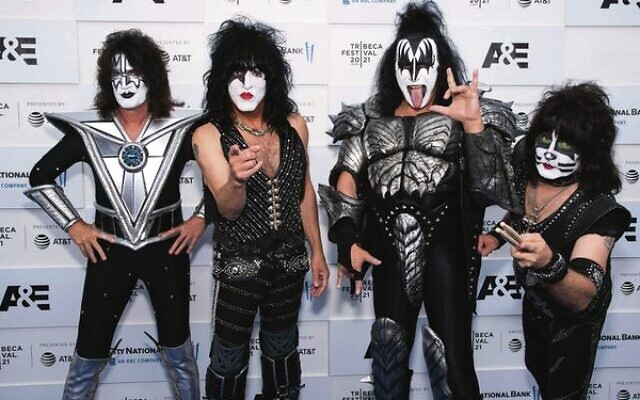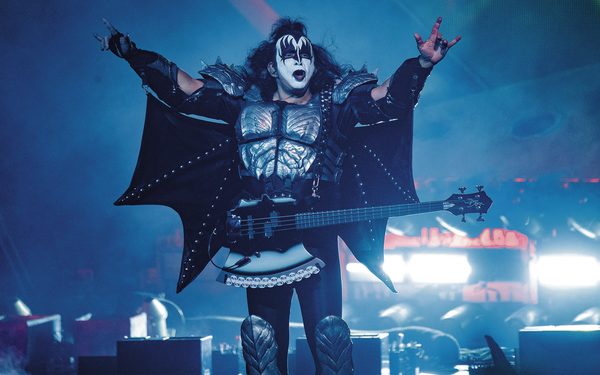We were made for loving Kiss
Kiss returns to Australia next month for one final additional farewell show, exclusive to Sydney. Jessica Abelsohn explores the craziness behind the most influential rock band, including Gene Simmons and Paul Stanley's Jewish roots.

In January this year, bass player and co-lead singer of the iconic rock band Kiss, Gene Simmons, called for widening identification with the Holocaust beyond the Jewish community during an event at the United Nations.
Simmons’s mother survived the Nazi death camps as a teenager, then moved to Israel after the war. Born Chaim Witz in the northern city of Haifa, Simmons moved to the US as a boy, identifies as Israeli and remains involved in pro-Israel advocacy.
But he’s not the only Jewish member of one of the most influential rock groups of all time.
Explaining to media outlets that he always thought his parents’ friends had phone numbers tattooed on their arms, guitarist and vocalist Paul Stanley discovered later in life that his mother was just a child when she was forced to flee Germany to escape Nazi persecution.
“As a small boy, I always wondered why there were numbers written on the arms of friends and acquaintances of my parents. They told us children that they were phone numbers,” Stanley told Bild newspaper in Germany. Stanley was so intrigued by his family’s history, that following a concert in Leipzig, he approached journalists from Bild for help in finding out more about his mother’s life. He discovered that his family had received a tip-off in November 1935 that there were on a list of the Gestapo. The family immediately jumped on a train to Prague, and four years later, found themselves safely in the US.
Kiss, which originally featured Simmons, Stanley, Ace Frehley and Peter Criss, has changed over the years, and now features Tommy Thayer and Eric Singer instead of Frehley and Criss.
According to a Times of Israel article published in 2014, Criss and Frehley were accused of antisemitism in a tell-all memoir by Stanley. The memoir explained the rift between the original four bandmates, saying it was, at least in part, due to antisemitism.
According to publications, it was well documented that Simmons and Stanley were particularly ambitious. Simmons had written publicly about wanting power and Stanley came out publicly saying he wanted respect. As children of people who had been through the war, the assumption was also that they wanted safety.
Some articles have even stated that the band wore such intense stage make-up as a way to help disguise their ‘Jewishness’, and that the creation of the Demon (Simmons) and Starchild (Stanley) was an attempt to act out inherited Holocaust trauma.

Simmons himself has backed this theory, telling comedian Howie Mandel that he became a chameleon to succeed. When asked if he had ever faced antisemitism, Simmons said, “A little bit. It’s not like being Black or Hispanic, because sometimes you can hide behind, ‘Oh, I’m Italian’ or ‘I’m Greek’; Jews have that ability. But basically … I was born Chaim Witz, and I understood that that didn’t work … I realised for myself that in order to succeed, I’ve gotta be a chameleon of sorts. Basically, dress British, think Yiddish.”
He also added that he avoided talking about his family so that he didn’t highlight his Jewish roots.
But did this drive to succeed cause the rift?
“Ace and particularly Peter felt powerless and impotent when faced with the tireless focus, drive and ambition of me and Gene,” Stanley wrote in his new book Face the Music: A Life Exposed.
“As a result, the two of them tried to sabotage the band – which, as they saw it, was unfairly manipulated by money-grubbing Jews.”
The relationship became so tense, that the foursome refused to reunite for a concert at Brooklyn’s Barclays Centre celebrating their impending induction into the Rock and Roll Hall of Fame.
The allegations of antisemitism were vehemently denied by Criss, who told TMZ that his favourite aunt was, in fact, Jewish.
Still, it took a long time for the original foursome to perform together. It was in the mid-1990s, in response to a wave of Kiss nostalgia, that the original members agreed to reunite, stage make-up and all.
This reunion tour grossed almost $US145 million, becoming the band’s most successful tour. While Criss and Frehley left the band again, Kiss agreed that after 45 years, they would do one final tour – The End of the Road World Tour. It began in January 2019 and will conclude in New York City in December 2023.
On the way to NYC, Kiss will be stopping in Sydney for one final goodbye. While originally, their final Australian show was meant to occur in September last year, a petition started by many Australian-based diehard Kiss fans, has encouraged the band to return once again.
“You have made your voices loud enough that it was impossible for us not to hear you,” Stanley said in a statement. “We are overwhelmed by your petitions and calls for one last KISS so we are now announcing that The End Of The Road will detour one last time to Sydney for a final bombastic farewell. As unexpected as this is for us, we will make it unforgettable for all who share the night with us.”

comments